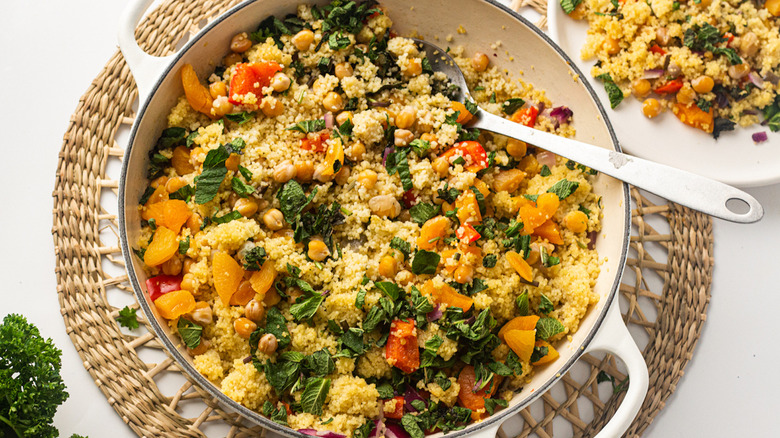Take Your Couscous Up A Notch With Moroccan Fermented Butter
You haven't had couscous until you've had it in Morocco — and, if you have, you've probably been thinking about it ever since. The food staple is traditionally served under a flavorful meat or vegetable stew, and while it's common all across the North African region, Moroccan people have their own way of preparing and serving their national dish. With the use of a couscoussière, Moroccans prepare the stew and steam the couscous at the same time. It's also traditionally consumed on Fridays, accompanied by Moroccan mint tea. Seasonings may also be mixed in, ranging from dustings of sweet cinnamon and sugar to a sprinkling of saffron and cumin-infused water. But, when they want to take it up a notch, they mix in some smen butter.
What is smen butter? It's a Moroccan delicacy. The thick, ghee-like preserved butter is aged for years. Though hard to come by outside of the Maghreb region — in the city of Fez there's a part of the medina known as Qaat Smen, or Smen Square, where the local people have been making it for centuries — smen is a fundamental ingredient in all facets of Moroccan cooking. From tagines to pastries, smen lends its funky, cheesy, fermented flavor to everything. It's essentially the Moroccan form of umami, and if you fold it into Tasting Table recipe developer Susan Olayinka's Moroccan couscous recipe while it's still warm, you'll get a depth of flavor that simply can't be compared to any couscous made without it.
There's more than one type of smen, and they're not created equal
Just like couscous, you haven't had smen until you've had it in Morocco. Not only is it harder to find outside its homeland and the North African region, but what you will find will more than likely be mass-produced, and won't taste nearly as good as what you'd get there. Some of us have to take what we can get, however. Walmart, for example, carries a specialty brand called Zamouri Spices, and while you can order it online, you might get lucky and find a container of their smen on the shelf in the world food section. In fact, it never hurts to stroll through the world food aisle of any supermarket just in case.
If you have an African foods store in your area, you're likely to come by more options. Still, they won't compare to what you'll come across in Morocco. The smen square in Fez, for instance, has all types of smen — from those made with honey and olive oil to khliyah, a preserved meat — and some of them have been aging there for years. Interestingly, some smens mellow out in flavor with age while others become more pungent. Either way, smen only needs to be used sparingly, and a little goes a long way. Spread it on toast and pastries, mix it into your vegetable tagine and couscous, or stir it into your coffee to take things up a notch.

